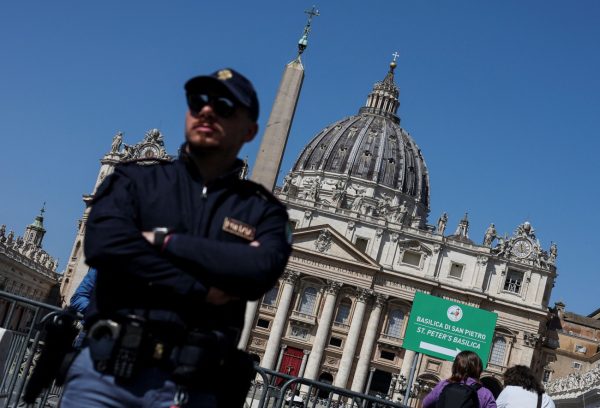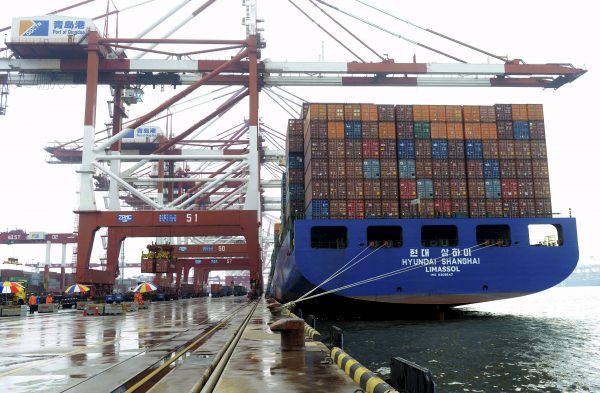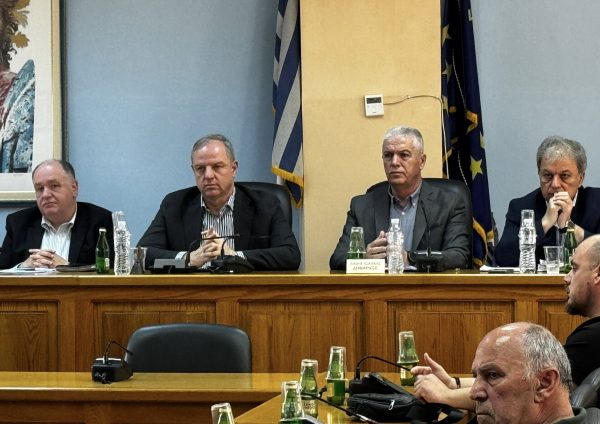
The announcement of the election results in Greece is closely followed by the foreign media.
Reuters speaks of a great victory for the New Democracy, however, questioning a clear majority victory by the ruling party. Similar is the BBC headline, which speaks of a victory for the centre-right, but not a majority.
The Associated Press points out that New Democracy is leading in the exit polls, but is unlikely to win enough seats to form a new government outright. He adds that Kyriakos Mitsotakis will seek alliances and that, in case of failure to form a government, Greece will go to new elections in late June or early July.
Bloomberg comments that voters appeared “convinced by Mitsotakis’ promise to capitalize on one of the fastest economic recoveries in the European Union, which has brought Greece to the brink of returning to investment grade.”
The same text explains that the next contest will take place under a different electoral system, which will give a bonus to the first party, dropping the threshold for independence to 38%, depending on the number of parties that enter the Parliament.
Germany “sees” Greece
The lead of New Democracy from the first exit polls was also recorded by the German media, with correspondents from Athens.
“The ruling party is ahead, according to the forecasts”, says the first channel of the German public television ARD on its website, speaking of a “clear lead” of New Democracy.
“The party was considered the favorite in advance”, notes ARD and adds that the formation of a government is not guaranteed and that PASOK may emerge as a regulator.
“Because, according to the forecasts, none of the parties has achieved an absolute majority, coalitions should probably be sought. In Greece, however, such alliances are rare and usually not particularly successful. If no government is formed, new elections must be held.
If the predictions are confirmed, Mr. Mitsotakis will have to either start difficult negotiations for an alliance with his opponents from Monday or plan a second round of elections, which will probably be held in July,” the report concludes.
“Heavy blow for the Left of Tsipras. Falling even further – ND leads”, is the headline of the Muenchner Merkur report, while in Welt the corresponding report is entitled “Governing party with wide lead”.
“Conservatives ahead, Left far behind,” headlines the report in Focus magazine.
Predictions disproved
Not only the opinion polls were refuted, but also the estimates of the foreign media which until this morning spoke of a duel without a clear winner.
Perhaps the most accurate prediction was made by Politico who wrote that “Greece’s conservative ruling party is expected to come out on top in Sunday’s election, but the marathon to form a government may have just begun.”
“Prime Minister Kyriakos Mitsotakis’ New Democracy party maintains a safe lead over its main rival, the leftist SYRIZA, according to the latest polls, despite his premiership being weighed down by a spying scandal, soaring inflation and growing concerns about the rule of law” noted the American magazine.
“But SYRIZA leader Alexis Tsipras still seems to be carrying the baggage of the turbulent first months of his leadership in 2015, at the height of the financial crisis, which led to Greece’s third international bailout,” he added shortly before the opening of the country’s elections. us.
A growth-first government or a generous welfare state? This was considered to be the dilemma of the election, the German news agency dpa. “On the one hand, Prime Minister Kyriakos Mitsotakis prioritizes stability, tax breaks and investments.
On the other hand, Alexis Tsipras is in favor of a better and more efficient welfare state,” explained the Greek edition of Deutsche Welle.
Economy vs wiretapping
Analyzing the stakes of the Greek elections, the French website France-info had written about three options for the voters, either to give a new mandate for the right, or for Tsipras to return or for a government coalition to exist, estimating the impossibility of winning an absolute majority as the most likely possibility resulting in a second round.
On the same wavelength, Reuters also predicted a duel without a clear winner, arguing that the rising cost of living made it difficult for Greeks, whose daily lives have already been hit hard by the 10-year crisis, to vote.
Also the Observer was off the mark, the Guardian’s Sunday edition, which wrote that “the prime minister’s modernizing narrative had collapsed” because of the “wiretapping scandal that evoked memories of surveillance during the 1967-74 dictatorship in Greece (and ) provided plenty of ammunition for his critics.”
“Then, in February, just when it looked like the crisis might be contained, a train crash in central Greece sparked outrage. 57 people died in the collision and subsequent fire – many of them students – in a tragedy that appeared to expose state ineptitude like never before,” the British newspaper concluded.
“Greeks are voting in the first elections since their country’s economy ceased to be subject to strict supervision and control by the international lenders that provided bailout funds during the nearly decade-long financial crisis,” the Associated Press wrote for its part. today’s election, while the Wall Street Journal, also citing the wiretapping scandal, had spoken of an election battle amid concerns about what it means for the rule of law in the country.
“Citizens will have to vote again in a few weeks,” was the assessment of the Washington Post, which explained that the proportional representation system makes it more difficult to form a government.
Al Jazeera also spoke about a neck-to-neck battle between the incumbent Prime Minister Kyriakos Mitsotakis and the leader of the official opposition Alexis Tsipras, noting that the simple proportional system does not favor the emergence of a clear winner, while according to the BBC “the train accident overshadows the vote dominated by dynasties’.
“Greeks are electing the leader who will have the most control over the country’s economy for the first time in 10 years”, was the safe and apt comment of ABC news.
What media in Turkey
Regarding the question of whether Turkey showed as much interest as Greece did in its own elections a week ago, Cumhuriyet ran under the headline “Election time in the neighborhood: Greece goes to the polls today” estimating that the economy “will determine the final outcome.”
“The Left in Greece is extremely fragmented and unable to form a solid front against the neoliberal agenda promoted by the ND”, was the conclusion of its central article.
The Anadolu agency had spoken of a “difficult electoral battle with little chance of a clear winner”, while Hurriyet had written cynically: “electoral upheaval in the neighborhood”.
Latest News

IMF: US Tariffs Shake Global Economy, Outlook Downbeat
IMF slashes global growth forecast to 2.8% as U.S. tariffs create uncertainty and ‘negative supply shock

First Step Towards New Audiovisual Industry Hub in Drama
The project is set to contribute to the further development of Greece’s film industry and establish Drama as an audiovisual hub in the region

Airbnb Greece – Initial CoS Ruling Deems Tax Circular Unlawful
The case reached the Council of State following annulment applications filed by the Panhellenic Federation of Property Owners (POMIDA)

Mitsotakis Unveils €1 Billion Plan for Housing, Pensioners, Public investments
Greek Prime Minister Kyriakos Mitsotakis has announced a new set of economic support measures, worth 1 billion euros, aiming to provide financial relief to citizens.

Alter Ego Ventures Invests in Pioneering Gaming Company ‘Couch Heroes’
Alter Ego Ventures' participation in the share capital of Couch Heroes marks yet another investment by the Alter Ego Media Group in innovative companies with a focus on technology.

Corruption Still Plagues Greece’s Driving Tests
While traffic accidents continue to claim lives on Greek roads daily, irregularities and under-the-table dealings in the training and testing of new drivers remain disturbingly widespread

Pope Francis Died of Stroke and Heart Failure Vatican Confirms
As news of the official cause of death spread, tributes poured in from across the globe. The 1.4 billion-member Catholic Church is united in grief, remembering a pope who championed inclusion, justice, and compassion

Increase in Both Museum Visits, Revenues for 2024
As expected, the Acropolis was the top archeological site in the country, followed by Sounion, Mycenae, the ancient theater of Epidaurus, and Vergina in northern Greece

Where Greece’s Tourists Come From: A Look at 2025’s Top Visitor Markets
The United Kingdom continues to hold the top spot as the largest source of incoming tourism, with 5.6 million seats booked for Greece this summer — up 2.2% from last year. This accounts for 20% of all international air traffic to Greece

Pope Francis: A Pontiff Who Reshaped the Papacy and Sparked a Global Conversation
His first words from the balcony of St. Peter’s Basilica—“Brothers and sisters, good evening”—set the tone for a pontificate that would challenge norms, favor mercy over dogma, and bring the papacy closer to the people.











![Πλημμύρες: Σημειώθηκαν σε επίπεδα ρεκόρ στην Ευρώπη το 2024 [γράφημα]](https://www.ot.gr/wp-content/uploads/2025/04/FLOOD_HUNGRY-90x90.jpg)




![Ξενοδοχεία: Μεγάλο το ενδιαφέρον για επενδύσεις στην Ελλάδα – Η θέση της Αθήνας [γραφήματα]](https://www.ot.gr/wp-content/uploads/2025/03/Athens-hotels-90x90.jpg)
























 Αριθμός Πιστοποίησης
Αριθμός Πιστοποίησης